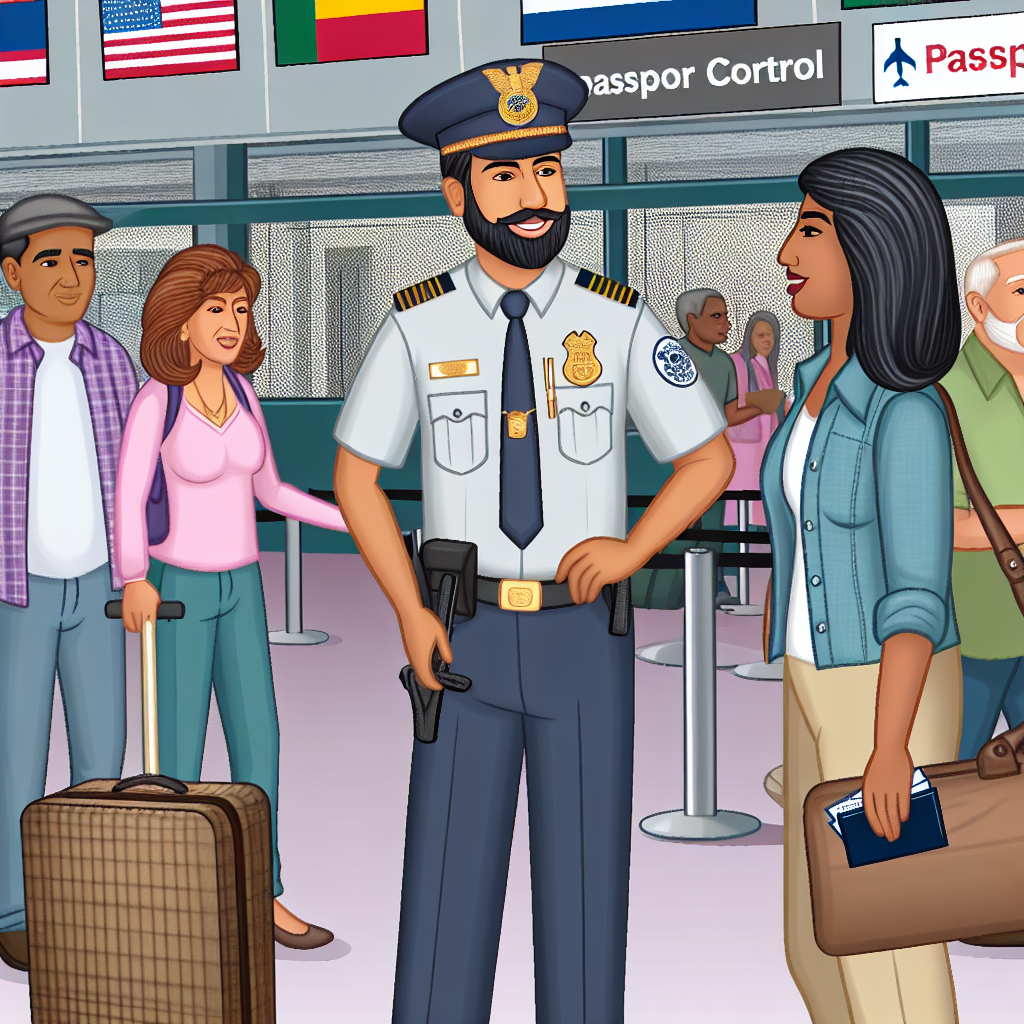Customs and Border Protection (CBP) Officers play a crucial role in safeguarding the borders of the United States.
They are responsible for enforcing immigration laws, preventing the entry of illicit substances, and ensuring the security of the country.
One of the key aspects of the CBP Officers’ role is the ability to communicate effectively with individuals from diverse backgrounds.
Language skills play a significant role in this regard, as they enable officers to interact with travelers, conduct interviews, and gather necessary information.
Having strong language skills allows CBP Officers to accurately assess individuals’ intentions, detect any potential threats, and facilitate smooth entry processes.
In situations where language barriers exist, officers with language proficiency can bridge the gap and ensure effective communication.
Moreover, language skills are essential for interpreting and translating vital documents, such as passports, visas, and customs declarations.
This ensures that the information provided by travelers is accurately understood and processed, contributing to enhanced border security.
The importance of language skills for CBP Officers cannot be overstated.
In a role that demands constant vigilance, quick decision-making, and effective communication, proficiency in multiple languages equips officers with the necessary tools to perform their duties efficiently.
They work to safeguard the nation’s borders.
Basic Language Skills Required:
Some common languages encountered at border crossings include Spanish, French, Mandarin, Arabic, and Russian.
Basic language skills are essential for effective communication with travelers from various linguistic backgrounds.
Having a working knowledge of commonly spoken languages can facilitate smooth interactions and help build trust with individuals entering the country.
CBP officers need to be able to ask questions, provide instructions, and convey information accurately to ensure security and efficiency at border crossings.
Basic language skills also enable officers to detect suspicious behavior or inconsistencies during interviews with travelers.
Being able to communicate in different languages can help CBP officers better understand the intentions and circumstances of individuals entering the country.
Language skills play a crucial role in preventing potential threats and ensuring compliance with immigration laws and regulations.
Importance of Language Skills for CBP Officers
Basic language skills are invaluable for CBP officers in carrying out their duties effectively and maintaining national security.
By being proficient in common languages encountered at border crossings, officers can enhance communication, detect suspicious behavior, and ensure compliance with immigration laws.
Transform Your Career Today
Unlock a personalized career strategy that drives real results. Get tailored advice and a roadmap designed just for you.
Start NowInvesting in language training can significantly benefit CBP officers in their mission to protect the nation’s borders.
Spanish Language Proficiency
Spanish is one of the most widely spoken languages in the world.
It has over 460 million native speakers.
Spanish is also the second most spoken language in the United States.
Approximately 41 million people speak Spanish as their first language.
Given these statistics, it is crucial for CBP officers to be proficient in Spanish.
This proficiency enables effective communication with Spanish-speaking travelers.
Prevalence of Spanish-speaking travelers
Spanish-speaking travelers are abundant when it comes to international travel.
Whether tourists, business travelers, or residents returning home, Spanish speakers traverse US borders daily.
Having a strong command of Spanish allows CBP officers to facilitate smooth interactions.
This enhances the overall efficiency of border security procedures.
Benefits of knowing Spanish for CBP officers
- Effective Communication: Knowing Spanish allows CBP officers to communicate directly with Spanish-speaking travelers, eliminating the need for interpreters or delays in processing.
- Enhanced Customer Service: By speaking the language of Spanish-speaking travelers, CBP officers provide a personalized and efficient experience, fostering positive relationships with visitors.
- Improved Security: Understanding Spanish helps CBP officers gather accurate information from travelers, enabling them to identify potential threats or suspicious activities more effectively.
- Cultural Sensitivity: Proficiency in Spanish demonstrates respect for diverse cultures and promotes a welcoming environment for travelers, enhancing the overall border crossing experience.
- Conflict Resolution: In situations where misunderstandings or conflicts arise, CBP officers who speak Spanish can quickly defuse tensions and resolve issues by communicating effectively with travelers.
Spanish language proficiency is a valuable asset for CBP officers.
It allows them to perform their duties more effectively and efficiently.
They maintain a high level of professionalism and customer service.
Uncover the Details: How to Become a Federal Probation Officer
Other Commonly Encountered Languages:
Spanish: One of the most common languages spoken at border crossings, especially in the southern states.
French: Spoken at the Canadian border, being able to communicate in French can facilitate interactions.
Mandarin: Given the increase in travelers from China, Mandarin skills can be very beneficial.
Arabic: With travelers from Middle Eastern countries, Arabic is a valuable language skill for CBP officers.
Showcase Your Business Today
Reach thousands of readers actively exploring professional services. Publish your business profile and grow your audience now.
Publish NowRussian: Commonly spoken by travelers from Eastern Europe and Russia, knowing Russian can be advantageous.
Being able to communicate in these additional languages can greatly enhance a CBP officer’s ability to effectively carry out their duties.
Here are some benefits:
- Improved Communication: By speaking the language of the travelers, officers can establish rapport and gain cooperation more easily.
- Enhanced Security: Understanding what travelers are saying in different languages can help identify any potential threats or suspicious activities.
- Cultural Understanding: Being able to speak other languages shows respect for different cultures and can help avoid misunderstandings.
- Quicker Processing: Communicating in a traveler’s language can speed up the processing time at border crossings.
- Professionalism: Demonstrating language skills shows professionalism and competency in dealing with diverse groups of people.
Having language skills beyond English can be a significant asset for CBP officers. It enables them to better serve and protect our borders.
Being able to communicate in languages commonly encountered at border crossings can enhance interactions, improve security measures, and foster cultural understanding.
Explore Further: Role of Language Skills in Counterterrorism Specialist Work
Interpreting Skills:
Interpreters play a crucial role in assisting CBP Officers in their daily operations.
They help bridge the language barrier between officers and individuals who do not speak English fluently.
- Interpreters provide accurate and timely translations of conversations, documents, and instructions.
- They assist in interrogations, interviews, and interactions with non-English speaking individuals.
- Interpreters help ensure that communication is clear and that there are no misunderstandings that could compromise safety or security.
Having interpreting skills can greatly enhance an officer’s effectiveness in various ways.
Firstly, it allows them to communicate effectively with a diverse range of individuals from different linguistic backgrounds.
- Being able to understand and interpret multiple languages can help officers gather crucial information during questioning or investigations.
- Interpreting skills also enable officers to build rapport and establish trust with non-English speakers, making it easier to elicit cooperation.
- Effective communication through interpreting can prevent conflicts and misunderstandings, leading to smoother interactions and operations.
Interpreters play a vital role in facilitating communication and ensuring effective interactions between CBP Officers and individuals who do not speak English.
Possessing interpreting skills can significantly improve an officer’s ability to perform their duties efficiently and professionally.
Discover More: Understanding Jurisdiction of Sheriffs
Cultural Understanding:
Emphasizing the importance of cultural awareness in border security is crucial for CBP officers.
Understanding different cultures helps officers navigate interactions with travelers from diverse backgrounds.
Language skills play a significant role in gaining insights into cultural nuances.
Officers who can communicate in multiple languages can establish rapport with individuals from various ethnicities.
Having a deep understanding of cultural norms and practices aids in effective communication and conflict resolution.
CBP officers with language skills are better equipped to de-escalate tense situations and prevent misunderstandings.
By being sensitive to cultural differences, officers can build trust and cooperation with travelers.
Language proficiency enables officers to interpret gestures, tone, and expressions accurately during interactions.
Officers who can speak the language of the travelers can provide assistance more efficiently and effectively.
Being able to speak the language of those crossing the border allows for better screening and identification of potential risks.
Continue to stress the importance of cultural understanding in border security.
It is vital for CBP officers to recognize and respect the diversity of individuals they encounter.
Utilize their language skills to bridge gaps and foster positive relationships with travelers from different backgrounds.
By embracing cultural awareness, officers can enhance the efficiency and effectiveness of their duties.
Gain More Insights: Correctional Officer Advanced Training

Language Training for CBP Officers:
When it comes to being a Customs and Border Protection (CBP) officer, language skills play a crucial role in carrying out your duties effectively.
Whether you are interacting with travelers, deciphering documents, or conducting interviews, having proficiency in multiple languages can enhance your performance and ensure national security.
Training Programs Available:
- **Customs and Border Protection Language Training Center (CBPLTC):** CBPLTC offers a variety of language courses tailored to the specific needs of CBP officers.
- **Government Language Training (GLT) Programs:** Through partnerships with various government agencies, CBP officers have access to a wide range of language training programs.
- **Online Language Learning Platforms:** In addition to formal training programs, CBP officers can also use online language learning platforms to practice and improve their language skills.
- **Immersion Programs:** Immersion programs provide CBP officers with the opportunity to fully immerse themselves in a foreign language and culture.
Benefits of Ongoing Language Education:
- **Improved Communication:** One of the most significant benefits of ongoing language education is improved communication with travelers, colleagues, and individuals you encounter in the course of your duties.
- **Enhanced Problem-Solving Skills:** Language skills can also enhance your problem-solving abilities as a CBP officer.
- **Cultural Sensitivity:** Language training goes hand in hand with cultural competence.
- **Career Advancement Opportunities:** Ongoing language education can open up new career opportunities within CBP and other government agencies.
- **National Security:** Finally, having strong language skills is essential for upholding national security.
Real-Life Examples:
- Situation 1: A CBP Officer at the airport proficient in Spanish was able to communicate with a non-English speaking passenger, resolving a misunderstanding quickly and efficiently.
- Situation 2: During a customs check, an officer who knew Mandarin was able to interpret a passenger’s declaration accurately, preventing potential smuggling attempts.
- Situation 3: In a border inspection, an officer fluent in French successfully identified a traveler with questionable intentions based on their conversation, leading to a seizure of contraband.
Illustration of Successful Outcomes:
- Outcome 1: By speaking Arabic, a CBP Officer gained trust from a nervous traveler, eventually uncovering crucial information about an imminent security threat.
- Outcome 2: A CBP Officer’s knowledge of Russian allowed them to verify the authenticity of documents presented by a suspicious individual, leading to an arrest for document forgery.
- Outcome 3: In a drug trafficking case, an officer fluent in Spanish was able to decipher coded messages, leading to the dismantling of a major smuggling operation.
In these real-life examples, it is evident that language skills play a vital role in the daily operations of CBP Officers.
The ability to communicate effectively in various languages not only enhances officer safety but also ensures the security of our borders and the safety of travelers.
Language proficiency enables CBP Officers to gather crucial information, prevent illegal activities, and build trust with individuals from diverse backgrounds.
Thus, investing in language training for CBP Officers can significantly impact the efficiency and success of border security efforts.
Importance of Language Skills for CBP Officers
Language skills play a crucial role in the performance of CBP Officers.
They enable officers to effectively communicate with individuals from diverse backgrounds.
Officers can gather information and ensure compliance with immigration laws.
Furthermore, language skills help CBP Officers detect potential threats.
These skills facilitate investigations and enhance overall security at ports of entry.
Officers with strong language skills are better equipped to handle complex situations.
Showcase Your Business Today
Reach thousands of readers actively exploring professional services. Publish your business profile and grow your audience now.
Publish NowThey can maintain a safe and secure environment.
Therefore, it is imperative for CBP Officers to continuously develop their language skills.
Improving these skills allows them to effectively carry out their duties.
They help uphold the mission of protecting the United States borders.
Additional Resources
US Department of Homeland Security (DHS) Language Access Plan
Border Patrol Agent | CBP Careers
[E-Books for Sale]
The Big Book of 500 High-Paying Jobs in America: Unlock Your Earning Potential
$19.99 • 500 High-Paying Jobs • 330 pages
Explore 500 high-paying jobs in America and learn how to boost your career, earn more, and achieve success!
See All 500 High-Paying Jobs of this E-Book
1001 Professions Without a Degree: High-Paying American Jobs You Can Start Now
$19.99 • 1001 Professions Without a Degree • 174 pages
Discover 1001 high-paying jobs without a degree! Unlock career tips, skills, and success strategies for just $19.99!




